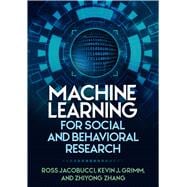Today's social and behavioral researchers increasingly need to know: "What do I do with all this data?" This book provides the skills needed to analyze and report large, complex data sets using machine learning tools, and to understand published machine learning articles. Techniques are demonstrated using actual data (Big Five Inventory, early childhood learning, and more), with a focus on the interplay of statistical algorithm, data, and theory. The identification of heterogeneity, measurement error, regularization, and decision trees are also emphasized. The book covers basic principles as well as a range of methods for analyzing univariate and multivariate data (factor analysis, structural equation models, and mixed-effects models). Analysis of text and social network data is also addressed. End-of-chapter "Computational Time and Resources" sections include discussions of key R packages; the companion website provides R programming scripts and data for the book's examples.








